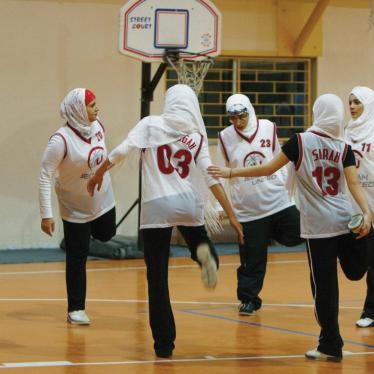(New York) – Announcements that Saudi Arabia is likely to send women to participate in the 2012 London Olympics for the first time are a positive step toward ending the country’s pervasive discrimination against women in sport, Human Rights Watch said today. However, Saudi Arabia is still in violation of the Olympic Charter due to its systemic violations of the right for women to participate meaningfully in sport in the kingdom, and the International Olympic Committee (IOC) should use its leverage to help affect lasting change for Saudi women.
“Sending women to the London Olympics does not change the fact on the ground in Saudi Arabia that girls and women are effectively excluded from taking part in sport,” said Sarah Leah Whitson, Middle East director at Human Rights Watch. “This is no moment for the IOC to celebrate, when girls remain barred from physical education in Saudi government schools as a matter of policy.”
Saudi Arabia is one of only three countries never to have sent a female athlete to the Olympics. The other two, Qatar and Brunei, do not bar women from competitive sports, and both governments have said that they will send women athletes to the London 2012 Olympic Games.
As recently reported by the media, Saudi Crown Prince Nayef bin Abd al-Aziz has approved the participation of female athletes in London as long as they “meet the standards of women’s decency and don’t contradict Islamic laws.” The IOC indicated in a statement on March 19, 2012, that it held a “very constructive meeting in Lausanne with the Saudi Arabian Olympic Committee,” following which “the IOC is confident that Saudi Arabia is working to include women athletes and officials at the Olympic Games in London in accordance with the International Federation’s rules.”
Human Rights Watch’s February 2012 report, “‘Steps of the Devil’: Denial of Women’s and Girls’ Rights to Sport in Saudi Arabia,” details how the Saudi government systematically discriminates against women in sports and physical education:
- Boys, but not girls, receive physical education in state schools;
- In 2009 and 2010, the government closed women’s gyms, contending that they were unlicensed – after denying licenses to women who applied;
- Neither the Saudi National Olympic Committee nor the Saudi national sports federations, nor the country’s 153 government-regulated sports clubs, have women’s sections; and
- The lack of any sports infrastructure for women effectively bars women and girls from participating in sport.
Human Rights Watch said urgent steps needed for meaningful reform include introducing physical education for girls in Saudi schools, opening women’s sections in male-only sports clubs, and allocating funds to women’s sport in the Saudi youth ministry, the National Olympic Committee, and sports federations.
“We share the high hopes for Saudi women to participate in the Olympics, but now is the time for the IOC to press the Saudi government to comply with the Olympic Charter and start systemic change in access to sport for women and girls,” Whitson said.
Human Rights Watch said that with four months until the start of the 30th Olympic Summer Games in London, the International Olympic Committee needs to put Saudi Arabia’s lack of compliance with the IOC Charter’s ban on gender discrimination on the agenda at its next executive board meeting on May 23 in Quebec, Canada.
Human Rights Watch pointed out when releasing its report in February that the exclusion of women and girls from sports and exercise in Saudi Arabia is just one facet of the country’s wide-scale, systematic discrimination against women and girls.
Women have virtually no rights to function as autonomous human beings in Saudi Arabia. Instead they are required to obtain permission from a male legal guardian – a father, son, or husband – to carry out ordinary life activities, including employment, education, medical procedures, opening a business or bank account, traveling, or marrying. While Saudi Arabia promised to reform its guardianship system in 2009, it has yet to take any measurable steps in that regard.
Women also face legally mandated segregation in all public places, including the work place, schools, and universities. Ending discrimination in sports has the potential to widen cracks in the guardianship system and other discriminatory practices, Human Rights Watch said.
“The movement toward ending discrimination against women and girls in Saudi Arabia is like a relay race, and participation of female Saudi athletes in the Olympics would amount to winning the first leg of the race,” said Sarah Leah Whitson. “For this race to be a true victory, the Saudi government needs to make genuine and immediate strides toward ending discrimination against women in sport.”







